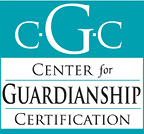Our Vision
Every professional guardian will obtain and maintain CGC certification.
Our Mission
The mission of the Center for Guardianship Certification is to provide comprehensive certification programs for guardians and other fiduciaries.
Providing “comprehensive certification programs” encompasses all aspects of the programs including conducting job and item analyses, mapping the exam(s) to the core competencies, vetting applications, conducting background checks, verifying CEUs required, providing the exam to applicants, oversight of the recertification process, maintaining a robust disciplinary process, and reviewing/revising the rules and regulations of the programs
Our Purpose
The purpose of the Center for Guardianship Certification is:
- To develop and administer a credentialing process for guardians.
- To address issues related to renewal, suspension and revocation of credentials for guardians.
- To encourage, support and foster best practices in the provision of quality guardianship services.
Core Value
Excellence in Certification


